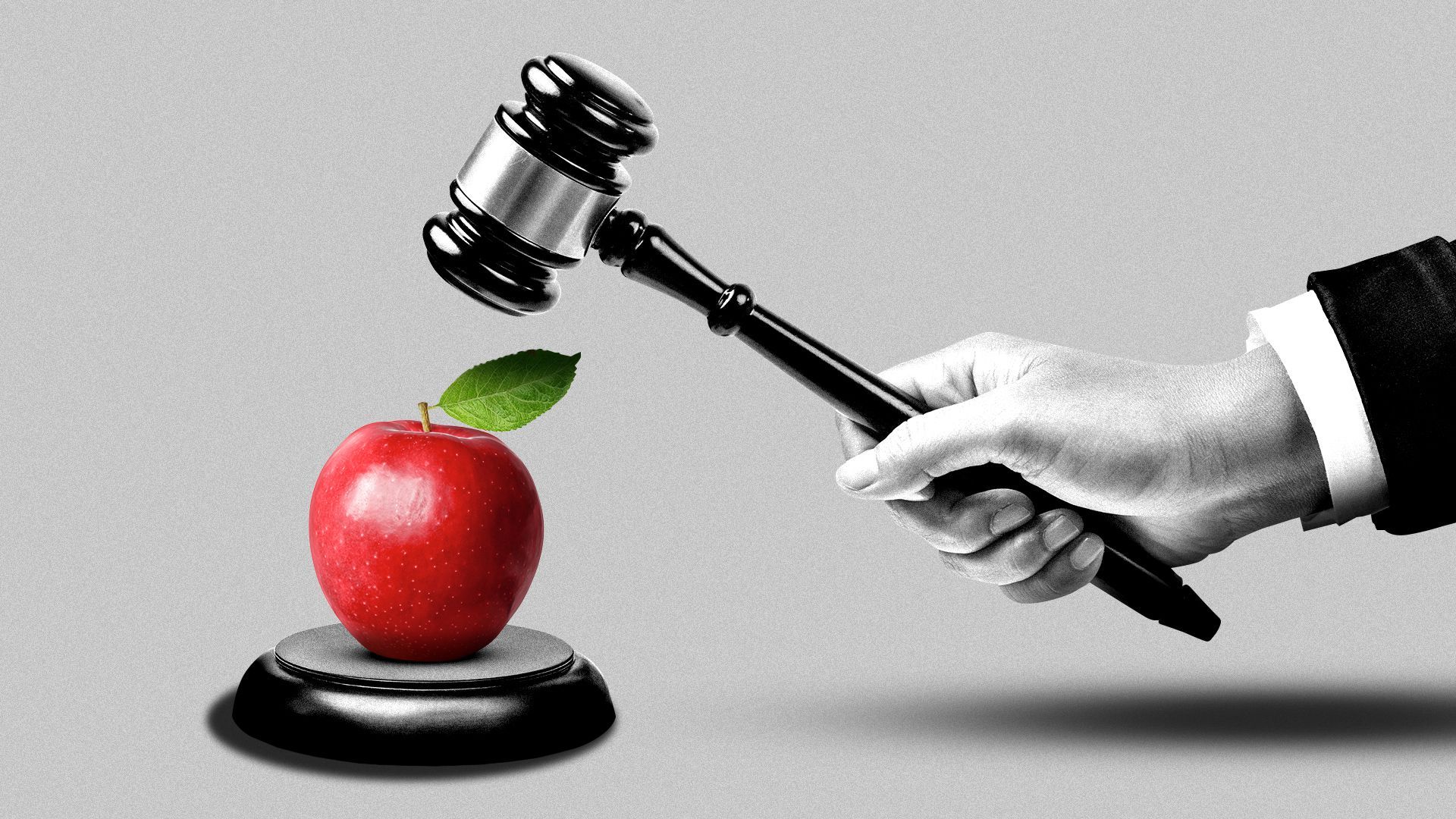Apple's antitrust fight turns Epic
Add Axios as your preferred source to
see more of our stories on Google.

Illustration: Aïda Amer/Axios
Millions of angry gamers may soon join the chorus of voices calling for an antitrust crackdown on Apple, as the iPhone giant faces a new lawsuit and PR blitz from Epic Games, maker of mega-hit Fortnite.
Why it matters: Apple is one of several Big Tech firms accused of violating the spirit, if not the letter, of antitrust law. A high-profile lawsuit could become a roadmap for either building a case against tech titans under existing antitrust laws or writing new ones better suited to the digital economy.
What's new: Epic on Thursday launched an effort to put Apple on its back foot in the courts of both law and public opinion over the up-to-30% commission it takes on in-app purchases and subscriptions and policies that block most developers from skirting that tax.
- Epic added an option for Fortnite players to either pay it directly to buy in-app currency or pay a premium to go through Apple. The move seemed to be a ploy to get Apple to do exactly what it did next: pull Fortnite from the App Store for breaking in-app payment rules.
- Almost immediately after, Epic revealed it's suing Apple, asking a federal judge to force Apple to relax the restrictions it places on payments and let developers offer their own payment options. Epic argues Apple is unfairly monopolizing the markets for both iOS app distribution and in-app payments.
- Epic also debuted a marketing campaign centered around a video parodying Apple's famous "1984" ad — this time, with Apple itself as the Big Brother figure and a Fortnite character as the iconoclast trying to tear down the system.
The big picture: Epic is just one of several developers clashing with Apple. Others include Spotify, Tinder parent Match Group and the makers of email app Hey.
- They all argue Apple is shaking down entire industries, in some cases putting direct competitors at a disadvantage. (Apple Music, for instance, is a rival service to Spotify.) And they say Apple is unafraid of any government officials holding it to account.
Yes, but: Apple is now facing antitrust scrutiny at home and abroad.
- App Store policies were a key subject of inquiry at the July House antitrust subcommittee hearing with CEO Tim Cook. Lawmakers suggested Apple holds undue power over developers and gives some preferential treatment, highlighting internal emails showing Apple once considered raising the commission fee to 40% and that it negotiated a 15% revenue share with Amazon for its Prime Video app.
- The European Commission, spurred in part by complaints from Spotify, opened an investigation in June into Apple's in-app purchases system and restrictions on developers.
Meanwhile: The gaming industry is already upset with Apple.
- Many mobile game makers have built a sizable chunk of their growth strategy around an iOS feature that lets app makers track user activity to, for instance, target would-be users by interest and see if they actually clicked on a mobile ad directing them to install a particular app.
- iOS 14, set for a September release, is poised to change that feature so that users have to expressly opt in to let an app track them. A number of gaming publishers told Axios they expect only 20-30% of users to do so.
- This will make it much harder for gaming publishers, especially smaller ones, to attract new users. (It will also serve as a blow to platforms like Facebook, Instagram, Snapchat and others that rely on app-install ads for revenue.)
Between the lines: Epic is marshaling a considerable mass of pent-up frustration with Apple in an effort to deal serious damage to the company. Even if it loses its court case, it could draw public attention and stepped-up regulatory scrutiny to Apple's practices.
- And it's doing it by putting users in the middle of the fight. That could be a risky proposition. But it could also leave Apple vulnerable, in part thanks to a recent Supreme Court case also involving the company.
Flashback: In 2019, the Supreme Court ruled in Apple v. Pepper that consumers have the right to sue anyone who delivers them goods, even though — in the case at hand — developers set the price of their apps, not Apple. The plaintiffs argued they were paying more for apps than a competitive market would allow due to Apple's 30% commission.
- Epic may have just alerted a whole generation of now-irritated gamers to the existence of that commission and the notion that it's unfairly leading to above-market prices.


